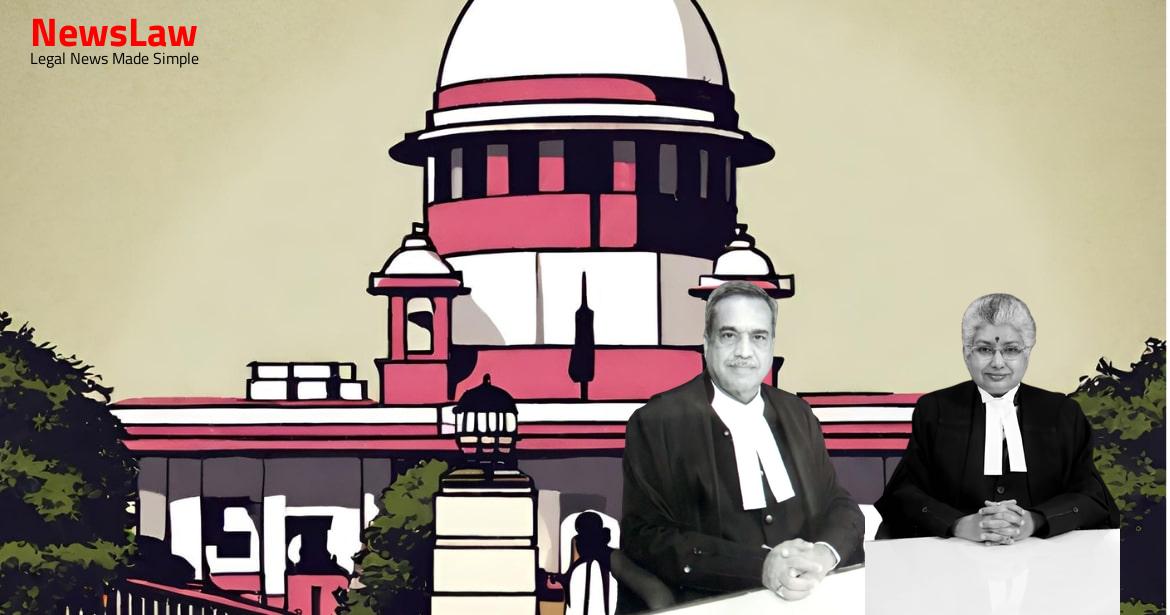The Division Bench of the High Court has set aside the penalty and interest levied under sub-section (6) of Section 45 of the Gujarat Sales Tax Act, 1969 (hereinafter referred to as the Act, 1969), the State of Gujarat has preferred the present appeal. The learned Tribunal vide order dated 29.09.2006 dismissed the appeal and confirmed the orders passed by the AO as well as the First Appellate Authority and thereby confirmed the aforesaid demand of difference in tax as well as the levy of interest under Section 47 (4A) and penalty under Section 45(6) of the Act, 1969. Before the High Court, the learned Senior Advocate appearing on behalf of the assessee fairly conceded that looking to the fact that 4 64 the authority has passed the assessment order on the basis of material available with it, they were required to pay the tax on the basis of 12% and that has been paid by the assessee since the opinion of the expert was turned out, however, the respondent – assessee restricted the appeal to the extent of challenging the levy of penalty and interest only by submitting that the assessee was under a bonafide belief that the contract works of the assessee would fall under Entry-1 requiring payment of tax at the rate of 2% only. 2 Feeling aggrieved and dissatisfied with the impugned judgment and order passed by the High Court whereby the penalty and interest has been set aside, the State has preferred the present appeal.
Mehta, learned counsel appearing on behalf of the State that the penalty leviable under Section 45(6) of the Act, being a statutory penalty, there is no discretion vested with the Commissioner to levy or not to levy, as long as the assessee falls under Section 45(5) of the Act, 1969. 6 It is submitted by the learned counsel appearing on behalf of the State that the moment it is found that the amount of tax assessed or reassessed exceeds the amount of 8 64 tax already paid by the dealer under Section 47 in respect of such period by more than 25% of the amount of tax so paid, the dealer can be deemed to have failed to pay the tax to the extent of the difference between the amount so assessed or reassessed and the amount paid and in that eventuality the dealer is liable to pay a penalty not exceeding one and one-half times the difference and/or, on such dealer, who is deemed to have failed to pay the tax to the extent mentioned in sub- section (5) of Section 45, a penalty shall be levied not exceeding one and one-half times the difference. 8
Also Read: https://newslaw.in/case-type/criminal/analysis-of-bail-granting-criteria-in-criminal-cases/
It is further submitted that the penalty leviable under sub-section (6) of Section 45 of the Act, is a statutory penalty and legislature has consciously used the word “shall” and even for interest the same language is employed in Section 47(4A) of the Act. 10 It is submitted that in case the penalty is a statutory penalty, there is no requirement to prove mens rea or to consider the aspect regarding bonafide belief of the assessee while computing payment of penalty and interest.
(2018) 6 SCC 549, as well as the decisions of the Gujarat High Court in the cases of Riddhi Siddhi Gluco Biols Ltd. State of Gujarat; (2017) 100 VST 305 (Guj) and State of Gujarat Vs. State of Orissa; 1969 (2) SCC 627 relied upon on 13 64 behalf of the assessee is concerned, it is vehemently submitted by the learned counsel appearing on behalf of the State that the said decision shall not be applicable while considering penalty and interest levied under Section 45(6) and 47(4A) of the Act, 1969. Pepsi Foods Ltd; (2011) 1 SCC 601 is misconceived and shall not be applicable to the facts of the case at hand since it interprets Section 11AC of Central Excise Act and the language of the provision at hand and that in Section 11AC is starkly opposite. It is submitted that in the said case, the High Court was dealing with Section 34(7) of Gujarat VAT Act, in which the language used is “If the Commissioner is satisfied that the dealer, in order to evade or avoid payment of tax…” That under the VAT Act, not only is the Commissioner vested with discretion but the said penalty provision is applicable specifically when the assessee has an intention to “evade or avoid payment of tax.” That in the present case, the legislature in its 17 64 wisdom imposed a liability of penalty and interest without reference to any requirement of mens rea on the part of the assessee. It is further submitted that with 18 64 reference to imposition of penalty, as per statutory provision, penalty is leviable only if differential tax liability (difference between tax assessed and tax paid) is more than 25%. (3) That for the purpose of imposition of penalty under Section 45(6) Gujarat Sales Tax Act, 1969, mens rea, blameworthy conduct, deliberate violation, evil doing, fraud, suppression (either one or more of them) must be proved. That accordingly, in case where there is a dispute regarding imposition of penalty under Section 45(6), it becomes necessary to determine if the dealer is liable to pay additional tax. Pramod Kumar Sahoo; (2019) 10 SCC 674, it is submitted that as held by this Court any concession in law made by either counsel would not bind the parties, as it is legally settled that advocates cannot throw away legal rights or enter into arrangements contrary to law. 23 64 4.5 It is contended that in the present case, since the penalty and interest were proposed to be waived by following the decision in case of Brooke Bond India Limited (supra), the advocate of the dealer did not press the issue of demand on merits. 8 It is next submitted that even otherwise Section 45(5) of the Act creates a 25 64 presumption against the dealer and such presumption is rebuttable in nature. It is submitted that any statutory provision by way of which penalty is imposed by tax authorities, the burden of proof to prove mens rea lies with revenue, however, a statute can shift the burden on the dealer in certain circumstances.
It is submitted that in case the presumption is rebutted by the dealer, the assessing officer will not impose penalty in exercise of its discretionary power. 10 As regards the other preposition that for the purpose of imposition of penalty under 27 64 Section 45(6), mens rea, etc., must be proved, it is vehemently submitted that it is a general principle of law, based on the maxim of “ actus non facit reum mens sit rea ” that an act does not make a man guilty, unless it can also be shown that he was aware that he was doing wrong. 11
It is further submitted by the learned counsel appearing on behalf of the respondent – assessee that Section 45(6) of the Act, 1969, provides for imposition of penalty “not exceeding” one and one-half times the differential tax demand. However, by the impugned judgment and order, the High Court has set aside the levy of penalty and interest, mainly on the grounds that the tax imposed had already been paid and that the assessee was under a bonafide opinion as to its tax liability and was following expert advice and therefore, paid the tax at the rate of 2%. 1
Also Read: https://newslaw.in/case-type/civil/acquisition-of-land-and-deemed-lapse-under-the-act-2013/
While appreciating the submissions made on behalf of the respective parties on the levy of the penalty and interest under Section 45(6) and Section 47(4A) of the Act, the relevant sections i.e., Section 45 and Section 47(4A) of the Act, 1969 are required to be referred to, which are as under: – “45. (3) If a dealer fails to present his licence, recognition or as the 33 64 case may be, permit for cancellation as required by section 35 or 36, the Commissioner may impose upon the dealer by way of penalty, a sum not exceeding two thousand rupees.
(4) If a dealer fails without sufficient cause to furnish any declaration or any return [as required by proviso to sub-section (1) or sub- section (2) of section 40], the Commissioner may impose upon the dealer by way of penalty, a sum not exceeding two thousand rupees. (4A) (a) Where a dealer does not pay the amount of tax within the time prescribed for its payment under sub- section (1), (2) or (3), then there shall be paid by such dealer for the period commencing on the date of expiry of the aforesaid 35 64 prescribed time and ending on the date of payment of the amount of tax, simple interest, at the rate of [eighteen per cent], per annum on the amount of tax not so paid or on any less amount thereof remaining unpaid during such period. (b) Where the amount of tax assessed or reassessed for any period, under section 41 or section 44, subject to revision if any under section 67, exceeds the amount of tax already paid by a dealer for that period, there shall be paid by such dealer, for the period commencing from the date of expiry of the time prescribed for payment of tax under sub-section (1), (2) or (3) and ending on date of order of assessment, reassessment or, as the case may be, revision, simple interest at the rate of [eighteen per cent] per annum on the amount of tax not so paid or on any less amount thereof remaining unpaid during such period.” 2 On a fair reading of Section 45 of the Act, it can be seen that as per sub-section (2) of 36 64 Section 45 of the Act, 1969, penalty is leviable if it appears to the Commissioner that a dealer has concealed the particulars of any transaction or deliberately furnished inaccurate particulars of any transaction liable to tax. Sub-section (5) of Section 45 provides 37 64 that in the case of a dealer where the amount of tax assessed for any period under sections 41 or 50 or re-assessed for any period under Section 45 exceeds the amount of tax already paid by the dealer in respect of such period by more than 25% of the amount of tax so paid, the dealer shall be deemed to have failed to pay the tax to the extent of difference between amount so assessed or re-assessed as aforesaid and the amount paid. Under the circumstances, to 38 64 the aforesaid extent and on the difference of tax, as per sub-section (5) of Section 45, the respondent – assessee – dealer shall be liable to pay the penalty as mentioned under sub- section (6) of Section 45. Sub- section (5) of Section 45 provides that where in the case of a dealer the amount of tax assessed for any period under Section 41 or 39 64 50; or re-assessed for any period under Section 44; exceeds the amount of tax already paid by the dealer under sub-section (1), (2) or (3) of Section 47 of the Act, in respect of such period by more than 25% of the amount of tax so paid, the dealer shall be deemed to have failed to pay the tax to the extent of the difference between the amount so assessed or re-assessed as aforesaid and the amount paid. As per sub-section (5), where in the case of a dealer the amount of tax assessed or re-assessed exceeds the amount of tax already paid by the dealer in respect of such period by more than 25% of the amount of tax so paid, the dealer shall be deemed to have failed to pay the tax to the extent of the difference between the amount so assessed or re-assessed and the amount paid. Further, there is no discretion with the assessing officer either to levy or not to levy and/or to levy any penalty lesser than what is 42 64 prescribed/mentioned in Section 45(6) of the Act, 1969. 6
In the case of Shriram Mutual Fund (supra) while dealing and/or considering similar 43 64 provision under the SEBI Act, it is observed and held that mens rea is not an essential ingredient for contravention of the provisions of a civil Act. The said case has no application in the present case which relates to imposition of civil liabilities under the SEBI Act and the Regulations and is not a criminal/quasi-criminal proceeding. Hence once the contravention is established then the penalty is to follow.” 7 In the case of Guljag Industries (supra) while considering Sections 78(2) and 78(5) of the Rajasthan Sales Tax Act, 1994 which provided for penalty equal to thirty percent of the value of goods for possession or movement of goods, whether seized or not, in 46 64 violation of the provisions of Clause (a) of sub-section (2) or for submission of false or forged documents or declaration, this Court in paragraph 9 observed as under: – “ 9. Existence of mens rea is an essential ingredient in every offence; but that presumption is liable to be displaced either by the words of the statute creating the offence or by the subject- matter with which it deals.
The breach of a civil obligation which attracts penalty under the Act would immediately attract the levy of penalty irrespective of the fact whether the contravention was made by the defaulter with any guilty intention. In the circumstances, we are of the view that mens rea is not an essential element in the matter of imposition of penalty under Section 78(5).” 8 In the case of Competition Commission of India (supra) while considering Section 43A of the Competition Act, 2002 which provides for a penalty, it is observed in paragraphs 34 to 37 as under: – “34. For the imposition of penalty under Section 43-A, the action may not be mala fide in case there is a breach of the statutory provisions of the civil law, penalty is attracted simpliciter on its violation.
In other words, the breach of a civil obligation which 50 64 attracts penalty under the provisions of an Act would immediately attract the levy of penalty irrespective of the fact whether the contravention was made by the defaulter with any guilty intention or not. … We also further hold that unless the language of the statute indicates the need to establish the presence of mens rea, it is wholly unnecessary to ascertain whether such a violation was intentional or not. Only discretion in the provision under Section 43-A is with respect to quantum of penalty.” 9 The Gujarat High Court while considering the very provision and penalty and interest imposed under Section 45(6) and Section 47(4A) of the Act, 1969, has taken a consistent view in the cases of Riddhi Siddhi Gluco Biols Ltd.
Now, so far as the levy of penalty is concerned, it is to be noted that the penalty is leviable under Section 45 and such a penalty is leviable under sub- sections (5) and (6) of Section 45 of the Act, 1969 and the penalty is leviable on purchase tax assessed.
1 In the present case, as the difference between total tax paid and the purchase tax is more than twenty-five percent, the respondent is deemed to have failed to pay the tax as per sub-section (5) of Section 45 and, therefore, liable to pay the penalty not exceeding one and one- half times. The intention of the legislature is very clear and unambiguous that the moment any eventuality as mentioned in Section 45(5) occurs, the penalty shall be leviable as mentioned in sub-section (6) of Section 45. 12
Under the circumstances, on strict interpretation of Section 45 and Section 47 of the Act, 1969, the only conclusion would be that the penalty and interest leviable under Section 45 and 47(4A) of the Act, 1969 are statutory and mandatory and there is no discretion vested in the 56 64 Commissioner/Assessing Officer to levy or not to levy the penalty and interest other than as mentioned in Section 45(6) and Section 47 of the Act, 1969. The words/language of the relevant provisions that fell for consideration in the decisions relied upon on behalf of the respondent is altogether different from the language used in 57 64 Section 45 and Section 47 of the Act, 1969.
58 64 6.14
Case Title: THE STATE OF GUJARAT AND ANR. Vs. M/S. SAW PIPES LTD. (KNOWN AS JINDAL SAW LTD.) (2023 INSC 376)
Case Number: C.A. No.-003481-003481 / 2022



